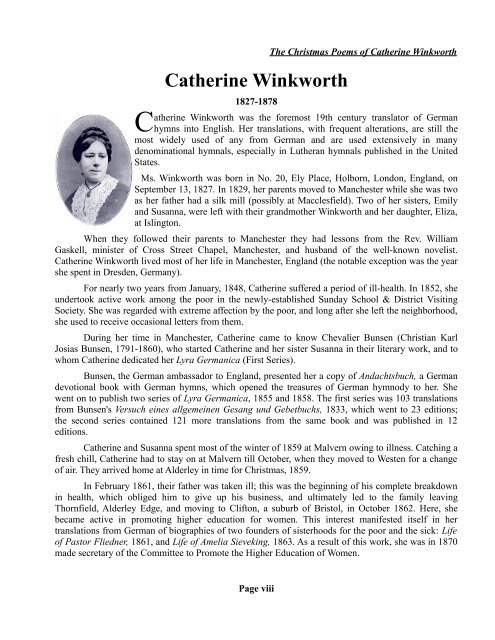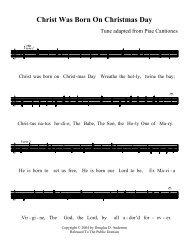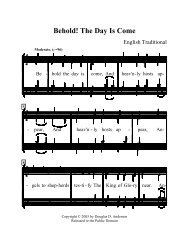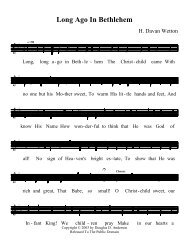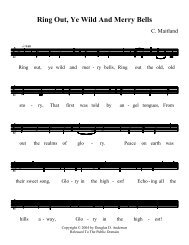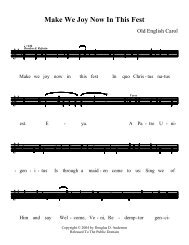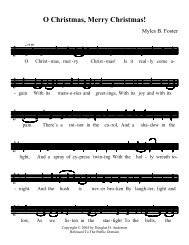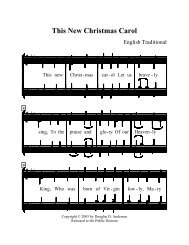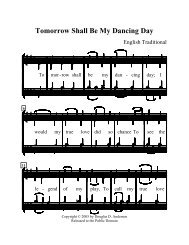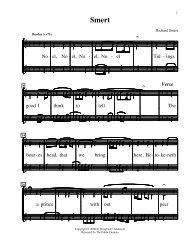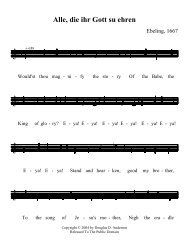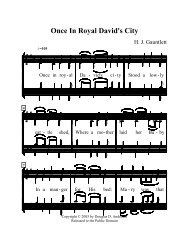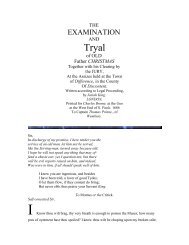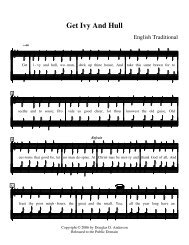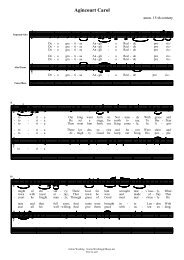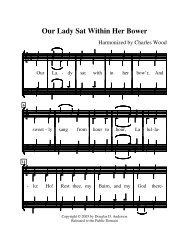All My Heart This Night Rejoices - The Hymns and Carols of Christmas
All My Heart This Night Rejoices - The Hymns and Carols of Christmas
All My Heart This Night Rejoices - The Hymns and Carols of Christmas
Create successful ePaper yourself
Turn your PDF publications into a flip-book with our unique Google optimized e-Paper software.
Catherine Winkworth<br />
<strong>The</strong> <strong>Christmas</strong> Poems <strong>of</strong> Catherine Winkworth<br />
1827-1878<br />
Catherine<br />
Winkworth was the foremost 19th century translator <strong>of</strong> German<br />
hymns into English. Her translations, with frequent alterations, are still the<br />
most widely used <strong>of</strong> any from German <strong>and</strong> are used extensively in many<br />
denominational hymnals, especially in Lutheran hymnals published in the United<br />
States.<br />
Ms. Winkworth was born in No. 20, Ely Place, Holborn, London, Engl<strong>and</strong>, on<br />
September 13, 1827. In 1829, her parents moved to Manchester while she was two<br />
as her father had a silk mill (possibly at Macclesfield). Two <strong>of</strong> her sisters, Emily<br />
<strong>and</strong> Susanna, were left with their gr<strong>and</strong>mother Winkworth <strong>and</strong> her daughter, Eliza,<br />
at Islington.<br />
When they followed their parents to Manchester they had lessons from the Rev. William<br />
Gaskell, minister <strong>of</strong> Cross Street Chapel, Manchester, <strong>and</strong> husb<strong>and</strong> <strong>of</strong> the well-known novelist.<br />
Catherine Winkworth lived most <strong>of</strong> her life in Manchester, Engl<strong>and</strong> (the notable exception was the year<br />
she spent in Dresden, Germany).<br />
For nearly two years from January, 1848, Catherine suffered a period <strong>of</strong> ill-health. In 1852, she<br />
undertook active work among the poor in the newly-established Sunday School & District Visiting<br />
Society. She was regarded with extreme affection by the poor, <strong>and</strong> long after she left the neighborhood,<br />
she used to receive occasional letters from them.<br />
During her time in Manchester, Catherine came to know Chevalier Bunsen (Christian Karl<br />
Josias Bunsen, 1791-1860), who started Catherine <strong>and</strong> her sister Susanna in their literary work, <strong>and</strong> to<br />
whom Catherine dedicated her Lyra Germanica (First Series).<br />
Bunsen, the German ambassador to Engl<strong>and</strong>, presented her a copy <strong>of</strong> Andachtsbuch, a German<br />
devotional book with German hymns, which opened the treasures <strong>of</strong> German hymnody to her. She<br />
went on to publish two series <strong>of</strong> Lyra Germanica, 1855 <strong>and</strong> 1858. <strong>The</strong> first series was 103 translations<br />
from Bunsen's Versuch eines allgemeinen Gesang und Gebetbuchs, 1833, which went to 23 editions;<br />
the second series contained 121 more translations from the same book <strong>and</strong> was published in 12<br />
editions.<br />
Catherine <strong>and</strong> Susanna spent most <strong>of</strong> the winter <strong>of</strong> 1859 at Malvern owing to illness. Catching a<br />
fresh chill, Catherine had to stay on at Malvern till October, when they moved to Westen for a change<br />
<strong>of</strong> air. <strong>The</strong>y arrived home at Alderley in time for <strong>Christmas</strong>, 1859.<br />
In February 1861, their father was taken ill; this was the beginning <strong>of</strong> his complete breakdown<br />
in health, which obliged him to give up his business, <strong>and</strong> ultimately led to the family leaving<br />
Thornfield, Alderley Edge, <strong>and</strong> moving to Clifton, a suburb <strong>of</strong> Bristol, in October 1862. Here, she<br />
became active in promoting higher education for women. <strong>This</strong> interest manifested itself in her<br />
translations from German <strong>of</strong> biographies <strong>of</strong> two founders <strong>of</strong> sisterhoods for the poor <strong>and</strong> the sick: Life<br />
<strong>of</strong> Pastor Fliedner, 1861, <strong>and</strong> Life <strong>of</strong> Amelia Sieveking, 1863. As a result <strong>of</strong> this work, she was in 1870<br />
made secretary <strong>of</strong> the Committee to Promote the Higher Education <strong>of</strong> Women.<br />
Page viii


